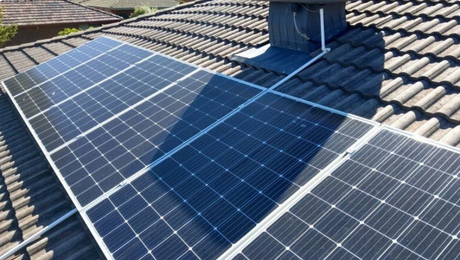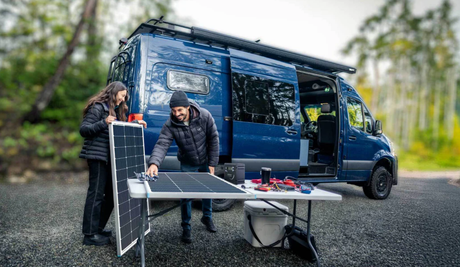Are you tired of looking at your ever-increasing power bill? Did you drive past a house with a shiny new solar panel array that got you thinking? When the desire for solar starts haunting you, it’s time for you to switch to solar!
However, determining your own solar power system involves having a basic understanding of electricity, components that are needed for a solar power system, wiring and fusing, etc. For example, when designing a solar panel system for your home, it is important to know how much electricity your house uses. If you are stumped by this matter, this is the blog for you.
How many kWh does the average home use?
The easiest way to find out “how much electricity does a house use” is to log into your utility’s online account and view your energy consumption history, or look into your monthly utility bill which is usually attached to the data of your past energy consumption. Down blow is a screenshot of an electricity bill sample.

So how many kWh does a house use per month?
Take the numbers in the table as an example: the overall electricity consumption in 2020 totals 13499.43 kWh. By dividing it by twelve, the average amount of kWh consumed per month for the house is about 1125 kWh. Of course, it will be more precise to loop in several years’ data to do the math, as electricity consumption may vary by year.

How much electricity does a house use per day?
On the previous electricity bill, there is also another column showing daily electricity consumption. Take an average number by adding them up all together and dividing them by the month you’ve covered, or you can directly divide the monthly data gained from the calculation above by twelve, which is, as the result, 37.5 kWh approximately per day. Calculating your average power usage per day follows suit.

What if it’s a new house? Calculate the watts needed to run a house
Maybe you're building a new house or have just moved into one and would like to get rolling on a solar system but don't know what to base your usage on. There are charts online, including ones on US home electricity usage. Canadian households are neck and neck with US households for energy consumption. These charts point out that the average household uses 886kWH per month.
Besides, using an online solar calculator to accurately determine how many watts to run a house is a smart move. Many of them include wattage charts for appliances allowing you to get a clearer picture of your usage to calculate the watt power that your household requires.

Without the help of solar calculators, you can also estimate your electricity consumption by knowing two things: the total wattage of each frequently-used appliance, and how much time you plan to use them.
We’ve listed a wattage chart for appliances for reference.

Next, give a time that you plan to run the appliances. For simplicity, we pick up several appliances randomly, and estimate their running time per day. For instance:

Here is how to do the final calculation - multiply the wattage and the running time of each electric device, then add all the results together, which is equivalent to:
1500W*5+500W*0.5+1500W*0.5+15W*2+7W*1+100W*0.5+150W*0.5=8662Wh, 8662Wh/1000≈8.7kWh
The result shows that your house might consume 8.7kWh per day, equivalent to 261kWh per month. In this way, things become easier to figure out how much electricity your house use per day.
Is that simple enough to do your own math? If still not, try the Renogy solar powered calculator in Canada and get freedom from the complicated calculation.
👉To help you get started, we're celebrating Labor Day with a special sale on all our products, including batteries, inverter, and solar panel kits! Hurry, this offer is for a limited time only!
Ways to lower your electricity bills
During the calculation, you might notice that some appliances do consume the predominant amount of electricity, such as the air conditioner, ice maker, water heater, oven, and other electricity eaters. Canada authority recommends choosing and using appliances with EnerGuide, a mark for products that are identified by Canada’s Energy Efficiency Regulations as the most energy efficient in their class.

Source: EnerGuide in Canada
Another effective method is the use of solar energy. The upfront cost to install a solar power system can be intimidating, averaging $3.01 per watt, equivalent to $24,080 for a typical 8kW system. The cost can be go much less or more depending on whether a solar battery is needed, what type of solar system you choose (off-grid, on grid or hybrid solar systems), and which solar installer you work with. Other considerations like choosing charge controllers (MPPT or PWM), inverters, wires and brackets can also affect the cost a bit. There are many more things we can go deep. If you are interested, you can check out our other articles:
- Are Solar Panels Worth It In Canada?
- How Long Do Solar Panels In Canada Last On Average?
- What To Know About Solar Batteries?
- Selecting a solar inverter for your installation
Find more helpful articles here.
What can Renogy help you?
At Renogy, we pride ourselves on designing, building, and supplying the best solar equipment that we can. You can find our award-winning products in RVs, vans, houses, cabins, remote equipment installations, and so much more. We mainly sell off-grid solar power system components from solar panels to wires for RV, motorhome and other small electricity scenarios, but we are also underway developing more products for home use. If you are looking for large-scale home energy storage solutions, our Lycan 5000 power box is exactly what you need. You may also check out more on our Renogy site.
We truly make something for every need. Questions? Don’t hesitate to reach out. We’re here to help you build the best solar system for your needs that we can.
Related articles:
Solar Panel Maintenance Guide: Practices, Cost, And Frequency
Net Metering for Home Solar in Canada
Making your home more energy efficient to prep for solar









